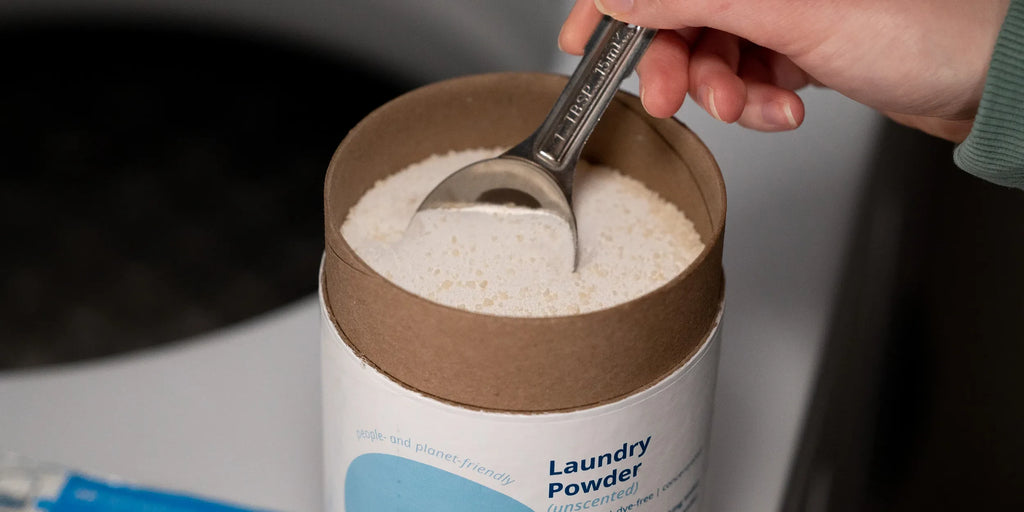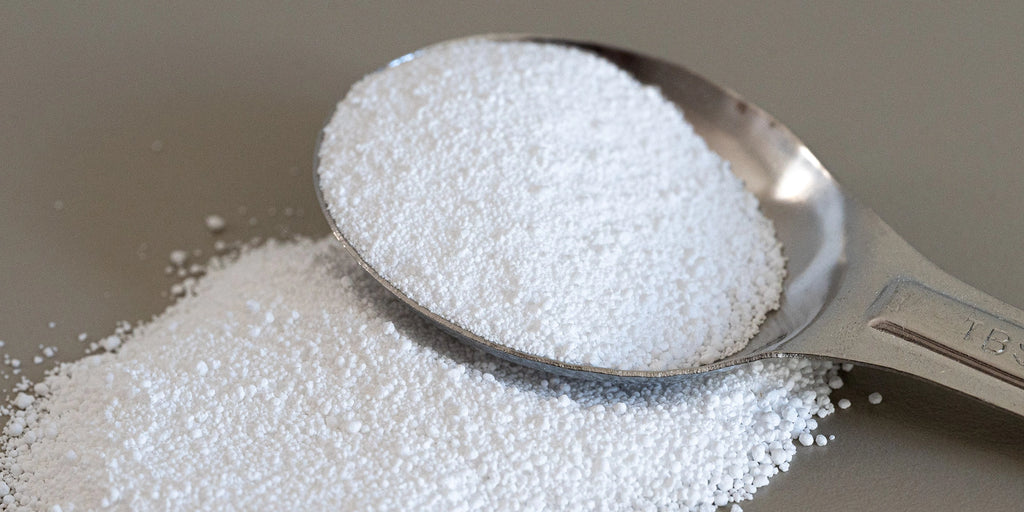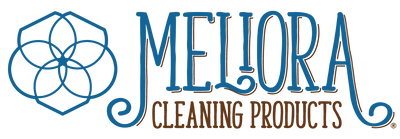What are plastic-free cleaning products?
Plastic-free cleaning products sound like they would be made, packaged, and distributed without any plastic use or containing any type of plastic. In reality, “plastic-free” is an unregulated term with no formal definition, meaning that many products (and companies that make them) make vague or nuanced plastic-free claims, whether they mean to or not.
For example, you might see claims such as “single-use plastic-free”, “plastic-free packaging”, “biodegradable plastic”, “bioplastic”, “compostable plastic”, or “made with ocean-bound plastic”. Each of these claims presents a different type of plastic use, making it difficult for people to find plastic-free cleaning products.
Despite the confusion caused by a lack of regulation and misleading marketing, many people are searching for “plastic-free” products to reduce the negative impact that plastic can have on both humans and the environment. Thankfully, there are ways to get beyond greenwashing and find products with less or even zero plastic.
At Meliora Cleaning Products, we say “plastic-free” cleaning products when referring to finished products that do not contain plastic.
Why are plastic-free cleaning products important?
Plastic is hazardous to humans and the environment throughout its entire life cycle. Plastic production and disposal have been linked to increased risk of numerous diseases, including lung and cardiovascular diseases and brain, breast, lung, and bladder cancer. Pollution from production and disposal facilities affects nearby communities, increasing the risk of premature birth, low birth weight, childhood leukemia, and other diseases.
Plastics used in consumer products often include toxic additives such as phthalates, BPA, and PVC. Plastic waste in the environment breaks down into increasingly smaller particles that absorb and concentrate toxic chemicals, increasing their toxicity to animals and humans. Humans and animals increasingly consume microplastics through food, water, and even the air we breathe.
At Meliora Cleaning Products, we believe the best approach to plastic pollution is to eliminate as much plastic production as possible. All our products are free of single-use plastic and most are completely plastic-free. People refusing to buy and use single-use plastics decreases demand for their production.
How can I tell if a cleaning product is plastic-free?
The best way to find plastic-free cleaning products is to investigate all environmental claims and check for packaging information, ingredient lists, and third-party certifications.
Beware of greenwashing! For each plastic-free claim, ask:
- What evidence does the manufacturer provide to back it up?
- How transparent are they about their practices? Pay attention to how the claim is presented.
- Is the phrasing vague and open-ended? Most companies that are serious about their environmental credentials will give details and support their claims with certifications from third-party evaluators.
It’s crucial to investigate both packaging and ingredients, as cleaning and laundry products can contain plastic in either or both places.
What are plastic-free packaging materials?
Paper, cardboard, metal, and glass are common plastic-free packaging materials. These materials are also highly recyclable. Paper and cardboard are often compostable, either at home or in commercial composting facilities. Metal and glass are both durable materials that can be used to make reusable and refillable containers.
Many cleaning products are packaged in plastic jugs, bottles, or bags. Paper and cardboard containers may be coated or lined with plastic, or contain products sealed in plastic wrappers or made with plastic polyvinyl alcohol (more on that later).
Liquid ingredients, which require watertight packaging, are usually the culprit. Concentrated powders, bars, and tablets that are free of excess water can be packaged, shipped, and stored in paper and cardboard without the need for plastic.

How to find plastic-free packaging
Packaging information seems like it should be easy to find since the packaging is a highly visible part of any product. Unfortunately, companies do not always list the packaging materials they use online or even on the label, making it difficult to make informed buying decisions. Companies can also hide materials or otherwise misrepresent their packaging as plastic-free. For example, cartons or cardboard boxes that appear to be alternatives to plastic bottles may still be lined with plastic or contain plastic-wrapped packets.
Look for companies and products that are transparent about the packaging and shipping materials they use. Check the packaging for recycling labels that include material information and end-of-life instructions. When in doubt, you can always contact the manufacturer and ask about their packaging practices. If they won’t tell you what they’re using, that’s a red flag!

What are plastic-free ingredients?
Baking soda, washing soda, sodium percarbonate, and plant-based soaps are common plastic-free ingredients. These ingredients can also be used to make concentrated powders and soaps that can be packaged without plastic. They’re also vegan, readily biodegradable in the environment, and derived primarily from plant and mineral sources.
The main plastic ingredient to look for in ingredient lists is polyvinyl alcohol, which may be listed as PVA or PVOH. Polyvinyl alcohol is a water-soluble synthetic polymer used to make pods, sheets, and strips. While the plastic dissolves and washes down the drain, it does not cease to exist. Research has shown that PVA does not adequately biodegrade during wastewater treatment and as much as 61% of PVA used ends up in the environment as microplastics.
Many home cleaning products contain ingredients derived from petroleum, which poses similar issues to plastic. The first detergents were manufactured using petroleum as a substitute for the animal- and plant-derived fats and oils traditionally used to make soap. Petrochemicals are still heavily used in home cleaners and detergents today, including laundry detergents and dishwashing liquids.
What does that have to do with plastic? The vast majority of plastic is made from petroleum, meaning plastic is a product of the oil and gas industry. We think it’s important for anyone looking to reduce their plastic use to understand that ingredients made from similar chemicals may be used in products they use regularly.

How to find plastic-free ingredients
You may not expect to find plastic in the ingredients list, which is exactly what some manufacturers are counting on for their plastic-free claims. Cleaning and detergent pods, sheets, and strips made from (polyvinyl alcohol (PVA or PVOH), a type of dissolvable plastic. Since PVA is considered to be an ingredient rather than packaging, products that contain may emphasize that they are made with “plastic-free packaging.” This is a form of misdirection that focuses attention on the lack of plastic bottles while simply replacing them with another type of plastic — one that is designed to dissolve and wash into our water systems, which is the opposite of what most people want from eco-friendly cleaners.
Ingredient lists can tell you a lot about cleaning products. If the ingredients aren’t listed, don’t buy the product! In the United States, companies are not legally required to disclose the ingredients used in any home cleaning product outside the state of California. The absence of an ingredient list is a major red flag.

Using different plastic is not the same as using no plastic
Simply put, most plastic used in home cleaning products is unnecessary and therefore wasteful. These products can be made in concentrated, shelf-stable powders and soaps packaged in paper, metal, and glass. Single-use plastic in cleaning products is rampant because liquid formulas that are mostly water and plastic containers to hold them are super cheap for manufacturers. More recently, pods and sheets have been falsely marketed as eco-friendly and plastic-free alternatives that are convenient to use around the house, further contributing to the use of disposable plastics.
Rather than designing wasteful plastic out of their products, many companies attempt to downplay the negative impact of their plastic use through greenwashing. Here are some examples of plastic greenwashing claims shared by the Plastic Pollution Coalition:
- “Made of recycled ocean plastic.” This phrase suggests that the product is helping remove plastic from the oceans. Plastic pollution can not be solved by the same plastic production and use that causes it.
- “Made of bioplastic” or “made from plants.” This claim suggests that plastics made from plants are an effective alternative to plastics made from petroleum. In reality, these bioplastics pose many of the same problems as other plastics. They are resource-intensive to produce, made with harmful chemical additives, and require specific industrial conditions to biodegrade.
- “Made of recyclable plastic.” This phrase perpetuates the idea that plastic recycling is a solution to plastic pollution, despite the fact that only 9% of plastic ever produced has been recycled. Moreover, most plastic recycling actually involves shipping it elsewhere to be burned or dumped.
What about single-use plastic-free products?
You may see some cleaning products described as “single-use plastic-free.” This means that the product does not contain any disposable plastic, or plastic meant to be used once and then discarded. Common examples of single-use plastics include plastic jugs, bottles, bags, wrappers, liners, films, pods, and sheets. Once you use up the product, the plastic no longer serves a purpose and must be thrown away, then replaced with more single-use plastic the next time you buy the product.
All plastic-free products are also single-use plastic-free, but some products may contain plastic that is intended to be used more than once. For instance, most soap dispensers and sprayers are made with plastic because there is no effective alternative. However, these plastic components may be used many times with reusable bottles and refill products. In this case, a product that includes a plastic sprayer may be free of single-use plastic while not being completely plastic-free.

While single-use plastic-free is less absolute than plastic-free, it may be a more accurate (and honest) way to describe how plastic is or is not used. Single-use plastic-free cleaning products can greatly reduce the amount of plastic used compared to single-use alternatives.
Are Meliora Cleaning Products plastic-free?
All our products are free of single-use plastic and most are completely plastic-free. That means no hidden liners, plastic scoops, or dissolvable pods or sheets. Most of our plastic-free packaging is made from recyclable cardboard, paperboard, glass, and steel. The only plastic in our entire product line is our bulk buckets and the sprayers that come with our All-Purpose Home Cleaner glass bottles, which are designed to be refilled and reused many times.
Our powdered products, including Laundry Powder, Oxygen Brightener, and Gentle Home Cleaning Scrub, come in cardboard and steel canisters. All you have to do to recycle them is separate the cardboard from the steel ends. Better yet, reuse the canister with our powder refills. Or buy our powders in bulk with our zero-waste bucket program. When you’re done with the bucket, send it back to us to wash and reuse for the next person.
All our solid soaps and refill tablets are packaged in paperboard boxes printed with vegetable-based inks. These are also recyclable and compostable at home. Some of our products are even available without the packaging — we just send you the soap and shipping materials.
You’ll never have to guess what’s in our products either. We list every ingredient on the package and online so you know what’s inside. We never use polyvinyl alcohol or petroleum-based ingredients. We use plastic-free ingredients certified by MADE SAFE®, including baking soda, washing soda, sodium percarbonate, and soaps made from organic coconut and sunflower oil. We always offer an unscented version of our products and we use organic essential oils for any scented products.
While we design our finished products to eliminate as much plastic as possible, plastic may still be used in other parts of the product life cycle, such as supply chain, manufacturing, and shipping. For example, our manufacturing team uses plastic gloves when handling chemicals while working in our facility.
If you have any questions about our packaging or ingredients, please don’t hesitate to contact us. Plastic pollution is a huge topic and this guide can only offer a brief overview. If there is any aspect you’d like us to explore in more detail, please let us know!
If you’re looking to swap out your laundry and cleaning products for plastic-free alternatives made with more responsible packaging and safer ingredients, check out our products below:
Plastic-free laundry detergent
Our plastic-free Laundry Powder is an ultra-concentrated alternative to liquid detergent, pods, sheets, and strips. It’s available in paper-and-steel canisters, as well as low-waste paper refills — no single-use plastic jugs or dissolvable PVA.
Plastic-free stain removers
Our Soap Stick and Oxygen Brightener are effective plastic-free stain removers. Soap Stick is a solid bar of vegetable soap that is effective at spot-treating fabric stains before a wash cycle. Oxygen Brightener is a powdered bleach alternative and laundry booster that pairs well with our Laundry Powder. It’s available in a paper-and-steel canister or paper refill.
Single-use plastic-free all-purpose cleaner
Our All-Purpose Home Cleaner is a single-use plastic-free cleaning spray solution that uses concentrated solid soap tablets to refill glass spray bottles.
Plastic-free cleaning powder
Our plastic-free Gentle Home Cleaning Scrub is a gentle cleaning powder scrub made with baking soda and vegetable soap to power through stubborn messes on hard surfaces.
Plastic-free dish soap
Our plastic-free Dish Soap is an eco-friendly alternative to liquid dish soap. By making a solid dish soap bar, we eliminate the need for single-use plastic bottles. This comes in either a paperboard box or package-free.
Plastic-free hand soap and body soap
Our collection of plastic-free soaps includes our Foaming Hand Soap Refill Tablets and Bath & Body Soap Bars. Both plant-based soaps come in compostable paperboard boxes or package-free and are vegan, plastic-free, palm oil-free, and made without synthetic fragrances.

